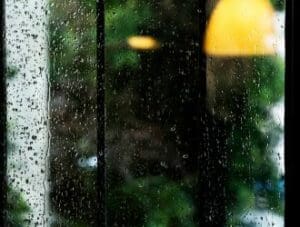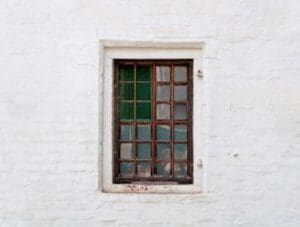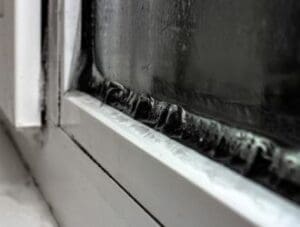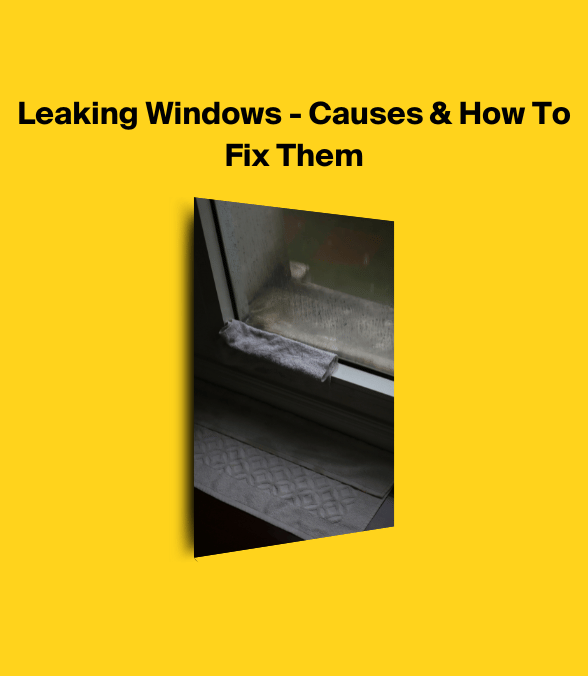Window Leaking Guide

Facing leaking windows? Quick action can mitigate damage. This article explains the likely causes and delivers straightforward fixes.

Build your window today!
Get a Quote
Arm yourself with the knowledge to prevent further leakage without unnecessary jargon or sales pitches.
Window Leaks - Summary
- Poor installation practices, the ageing and deterioration of window components, and severe weather conditions can cause window leaks, each necessitating different approaches for repair and prevention.
- Early detection of window leaks is extremely useful. Water stains, drafts, energy loss, or condensation can indicate these issues, and addressing them promptly can prevent more serious damage.
- Preventing future leaks involves regular window maintenance, upgrading to energy-efficient windows with improved seals, and ensuring proper installation by professionals to mitigate the risk of water intrusion.
Why Do Windows Leak?
Window leaks can be a homeowner’s worst nightmare, causing structural damage, mould growth, and increased energy bills. But what causes window leaks?
The answer isn’t as straightforward as you might think. Understanding the reasons behind window leaks can help you prevent them and save you from potentially expensive home repairs.
Window leaks primarily result from three sources: improper window installation, window ageing and wear, and extreme weather conditions.
Each of these factors plays a significant role in why windows are leaking, and understanding each can help you find the right solutions to fix them.
Poor Window Installation
Window leaks often result from substandard window installation. Whether it’s a new installation or a replacement, if the window is not properly installed, it can lead to major problems down the line.
But how does poor installation result in window leaks?
The key to understanding this lies within the intricacies of the installation process.
For instance, improper installation or the absence of flashing can allow moisture to infiltrate the window opening, resulting in leaks.
Effective sealing is vital in blocking the formation of air channels between the wall and window, which can lead to leaks.
If the window flashing is compromised or if the house wrap is substituted for proper flashing, water can infiltrate into the house's wall structure.
Accurate measurements and careful window installation, ensuring an exact fit, are indispensable steps to prevent potential window leaks.
Window Age and Wear
With time, window components can degrade, weaken glass seals or wear out weatherstripping. This deterioration allows water to penetrate the home and can impact the window’s insulation effectiveness, causing leaks.
But what exactly happens as windows age and wear?
Ageing windows are often leak-prone due to worn components, faulty seals, or degrading materials.
Typical material deteriorations include difficulty opening windows, excessive window condensation, draughty windows, rotten window frames, broken window panes, and leaking.
Over time, water, sun exposure, and temperature variations can damage the seal, resulting in window seal failure and leaks.
Weather Conditions
Leaky windows can also be a consequence of severe weather conditions. This is especially true for homes located in regions that experience heavy rain or snow.
But how exactly do weather conditions contribute to window leaks?
Extreme weather conditions can breach window defences, especially when flashing or sealant is damaged or missing, resulting in windows leaking water.
In times of heavy rain or snow, windows that lack proper protection or have not been regularly maintained are more prone to water intrusion, which can result in leaks.
Identifying Leaking Window Issues
Before you get ahead of yourself and start calling someone to fix it, you should first identify the actual problem and how it is being caused.
Detecting window leaks is an essential measure to avoid potential home damage. While it can sometimes be obvious, like water dripping down your window frame during a storm, other times, it can be more subtle.

Understanding the signs of window leaks can help you catch and address the issue before it leads to more serious damage.
Indications of window leaks can vary.
There are visible signs, such as water stains and damage, and subtle signs, such as drafts, energy loss, condensation and moisture.
These signs can indicate a potential window leak, but it’s important to understand what to look for to identify the issue accurately.
Water Stains and Damage
Water stains and damage around the window are conspicuous signs of a leak. But what exactly should you look for, and how do you know if the stains and damage are caused by a leaking window or something else?
Water stains around windows can be identified by discolouration on the walls or window sills, spotting or stains around the window, and common discolouration colours such as brown, yellow, or copper.
However, it’s important to note that water stains or damage around windows can also be caused by other factors, such as water accumulation on the inside of the glass or deteriorated caulk or seals.
Draughts and Energy Loss
Drafts and noticeable energy loss can also indicate window leaks. This is often a less obvious sign, as it’s not something you can see but rather something you can feel or notice in your energy bills.
So, how exactly do draughts and energy loss indicate potential window leaks?
Draughts indicate an air leak resulting from a gap or opening in the window seal, potentially indicating a leak.
Similarly, energy loss results from these air leaks, which cause temperature changes, leading to increased energy consumption and higher energy bills.
Condensation and Moisture
Another potential sign of a leak is condensation and moisture on windows. While these factors are often mistaken for unrelated issues, they can actually be significant indicators of a leaking window.
But how exactly do condensation and moisture signal the presence of leaks?
Condensation and moisture on windows can often result from:
- Damaged window seals compromise the insulation and temperature regulation of windows, causing heightened drafts and moisture penetration.
- Inadequate insulation can result in condensation on windows due to the temperature disparity between the cold exterior and the warm interior air, causing moisture from the air to condense on the glass surface.
- Insufficient ventilation results in excessive humidity within a confined space, which can also lead to condensation on windows (trickle vents can help to fix this and allow better airflow).
Leaking Window Repairs
Upon identifying a window leak, it’s vital to rectify it to avert additional home damage promptly.
But where do you start? The most effective solution will depend on the cause and severity of the leak, but several common repair methods can help.
There are various ways to fix window leaks, from recaulking and sealing the window to replacing damaged components.
In some cases, it may be necessary to hire a professional to assess and repair the issue, especially if the damage is extensive or the cause of the leak is not immediately obvious.
Recaulking and Sealing Window
Addressing leaking windows can be as straightforward as recaulking and resealing the window. But what exactly does this process entail, and how can it help prevent leaks?
Recaulking the window entails removing the damaged caulk and applying new silicone caulk to seal any gaps or cracks around the window frame effectively.
This process can help prevent water intrusion and its subsequent issues, such as mould growth and structural damage.
However, it’s important to note that recaulking a window is not always sufficient to fix a leak, especially if more complex issues like poor installation or damaged components cause it.
Replacing Damaged Window Components
At times, a window leak may be caused by a damaged component that requires replacement. But which components will likely need replacement, and how can this help fix a leak?
Seals, flashing, and even the glass themselves are common window components that may need to be replaced.
Replacing damaged components can help fix leaks and improve the window’s performance, ultimately preventing further water intrusion and potential damage to your home.
However, it’s important to note that this process can be complex and may require professional assistance to ensure the replacement is done correctly and effectively.
You must also consider the cost of new windows and whether the process is worth it in the long run.
Hiring a Professional
In certain instances, professional assistance might be required to evaluate and repair a leaky window. This is especially true for more complex issues or if the damage is extensive.
But when should you consider hiring a professional, and what are the benefits?

Hiring a professional to evaluate and remedy leaking windows can provide numerous advantages, such as:
- Assured work that can result in long-term cost savings
- Enhanced safety and security
- The requisite expertise and proficiency to deliver optimal services and efficiency
Professionals are equipped with the necessary tools and knowledge to identify the leak's cause correctly.
They can then implement the most effective solution to address the issue properly. This prevents further damage to your home and safeguards its integrity.
This ensures that the issue is properly addressed and prevents further damage to your home.
Prevent Future Window Leaks
Now that you've sorted out your leaky windows, it's time to ensure that this doesn't happen again for your happiness and your wallet.
While rectifying existing window leaks is vital, prevention remains paramount.
By taking proactive measures to stop window leaks, you can save time and money and avoid the potential hassle of dealing with damage later on.
So, what steps can you take to deter future window leaks?
Regular window maintenance, upgrades to energy-efficient windows, such as picture windows or uPVC windows, and correct installation are necessary to prevent future window leaks.
Each of these measures plays an important role in stopping leaks and maintaining the integrity of your windows.
Regular Window Maintenance
Routine window maintenance plays an instrumental role in leak prevention. It involves checking your windows regularly for signs of damage, cleaning drainage channels, and identifying any issues that could lead to leaks.
But what does regular maintenance entail?
Regular maintenance procedures to prohibit window leaks involve conducting annual inspections for peeling caulk, cracks in the glass, gaps around the edges, and peeling paint.
Regular window cleaning also significantly prevents leaks by maintaining the cleanliness and integrity of window seals.
Engaging in these regular cleaning practices reduces the potential for seal damage, ensures the proper functioning of windows, and ultimately mitigates the risk of water intrusion.
Upgrading to Energy-Efficient Windows
Switching to energy-efficient windows can be beneficial in stopping leaks.
These windows are designed with features like double glazing and improved seals that help improve your home’s energy efficiency and also help stop leaks.
But how exactly do energy-efficient windows prevent leaks?
Energy-efficient windows aid in preventing leaks by incorporating enhanced sealing, caulking, and weatherstripping, effectively reducing the passage of air and moisture.
Materials such as uPVC, aluminium, fibreglass, and metal or vinyl frames are commonly employed in constructing energy-efficient window frames to improve their longevity and resistance to leaks.
Proper Installation
Lastly, correct installation is vital to prevent window leaks. Whether it’s a new installation or a replacement, properly installed windows can help prevent leaks and improve their performance.
But what does proper installation entail?
Proper installation requires precise window fitting to eliminate gaps that could allow water to enter.
A professional window installer ensures this by using high-quality sealants and weatherstripping to create a watertight barrier on the window sill.
This barrier is essential in preventing water from seeping through and causing leaks. On the other hand, an improperly installed window can lead to such issues.
Repairing Window Leaks - Our Thoughts
From reading this guide you should now know that window leaks are a common issue for homeowners. Various factors, including poor installation, age and wear, and extreme weather conditions, can cause them.
However, by identifying the signs of a leak, implementing effective repair methods, and taking preventative measures, you can protect your home from the damaging effects of window leaks.
Remember, prevention is key. Taking proactive steps to maintain your windows and address any issues promptly can save time, money, and potential damage down the line.
Frequently Asked Questions
Why do my windows leak when it rains?
Your windows may leak when it rains due to damaged or missing sealant or caulk, which can be a common and overlooked cause.
To fix this, clear out any damaged caulk around the window and replace it with a new bead of silicone caulk.
How do you stop water dripping from windows?
To stop water dripping from windows, you can reseal the glass to the gasket with clear silicone caulk after checking for damaged caulking and cleaning the window frame.

Why do windows leak in winter?
Windows often leak in winter because condensation forms on the glass when it is cooler than the warm, moist air around it.
This leads to drips and accumulation that resemble a leak.
What is the significance of proper installation in preventing window leaks?
Proper installation by professionals ensures the correct fitting of windows with suitable sealing and weather resistance features, which plays a big role in preventing leaks.
Is it worth upgrading to energy-efficient windows?
Yes, upgrading to energy-efficient windows is worth it, as they can prevent leaks and improve your home's energy efficiency.
They are built with enhanced sealing, caulking, and weatherstripping and are made from materials that improve longevity and resistance to leaks.









